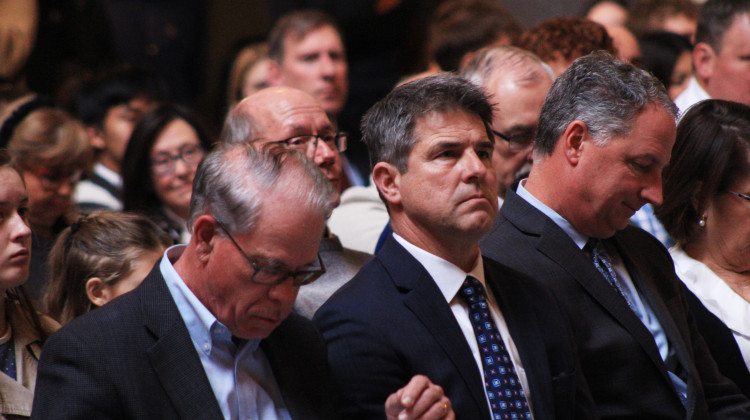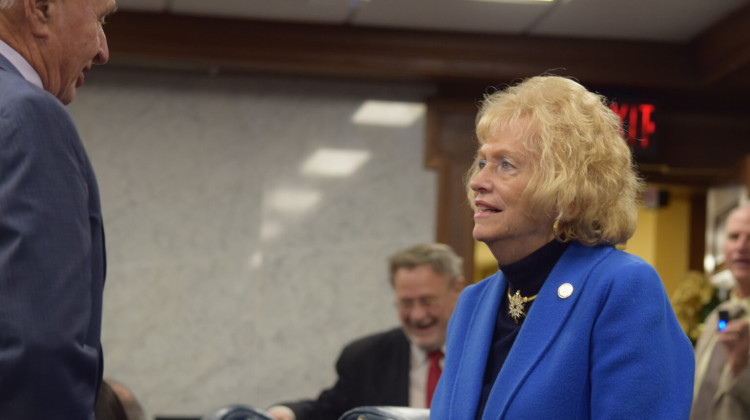
James Ratican, administrator at the I.U.O.E. Local 103 Apprenticeship and Training facility, says his program is at risk of losing funds if the common construction wage is repealed.
Photo by Payne HorningEighty years after passing the common construction wage, the Indiana General Assembly is now considering repealing the law. Authored by Rep. Jerry Torr, R-Carmel, House Bill 1019 would eliminate Indiana’s prevailing wage, which is a mandatory hourly rate that must be paid to laborers on publicly financed construction projects.
When a public entity decides to finance a construction project that will cost more than $350,000, state law requires that the wage be determined by a local committee of taxpayers, the awarding agency and labor representatives. They use industry data to decide what the most commonly paid wage has been in that area on similar projects in the past.
But critics of the law, like Torr, say it favors the union labor wages – which are more than what non-union firms pay.
“That costs taxpayers more money than if we had free market competition,” Torr said.
Local Governments
Torr said this “artificial” wage hinders what is supposed to be a competitive process that lowers bid prices. He said repealing it will open the process to more bidders and result in a savings for cities of 10 to 20 percent.
“A few years ago we passed the property tax cap,” Torr said. “Local governments are being squeezed a little bit. This is just trying to give them another tool to help save some money.”
He points to Ohio where, in 1997, the state exempted its public schools from paying a prevailing wage. An Ohio Legislative Service Commission study in 2002 found that the state saved $487 million dollars – or about 10.7 percent – after eliminating the wage.
John Crawford is the president of the Fort Wayne City Council. He said that savings could mean more or bigger projects for the city.
“I need freedom to make the money that I do have available go as far as I can for the citizens of Fort Wayne,” Crawford said. “I don’t like to be restricted from using the free market.”
But Fort Wayne Community School Board President Mark Giaquinta says prices drop when you have more bidders at the table. Eliminating the common construction wage will just drive union companies to the private market where bidders are more willing to pay more.
“When you bid for construction work you want to do all you can to attract them to your work and you want to avoid those things that drives them away,” Giaquinta said.
State law requires public entities to take the lowest responsive and responsible bid. Giaquinta said this forces them to always select the lowest bid or face a potential lawsuit.
“Ninety-nine percent of the time, unless we want to buy a lawsuit, we take the low bid,” Giaquinta said.
Giaqunita said the system will be unbalanced if the common construction wage, which he says favors unions, is eliminated and the lowest bid requirement, which he says favors non-unions, remains.
“Get rid of both so we can protect the taxpayers by picking the company who is best suited to do the work without regard to their bid price,” Giaquinta said.
Labor Force
But, the debate isn’t simply union versus non-union. Peter Philips is a senior labor economist at the University of Utah. He recently released an economic impact report on Indiana’s common construction wage. According to his report, the biggest cost of eliminating the wage will come in a reduction of labor productivity, construction quality and worker’s pay.
“The punchline of essentially two decades of research is that that kind of regulation keeps the construction industry healthy, it keeps the labor force trained and qualified and provides the kind of incentive so that if you are a trained and experienced worker you will stay in the industry even despite the downturns or seasonal lack of work,” Philips said.
According to Philip’s report, 94 percent of Indiana’s annual investments in apprenticeship programs come from union companies.
Philips says that because 25 percent of the bidding contract pays for labor costs, cutting ten to 20 percent off of public projects will come at their expense.
“The real question becomes which is better: to develop a local labor force on public works that are skilled and productive and capable of taking on work across the full range of public or private construction or go down the unskilled laborer approach, risking lower wages for people in your community,” Philips said.
James Ratican, administrator for a construction apprenticeship and training program in Anderson, realizes that without the common construction wage his program is at risk.
“As far as trimming the fat, the fuel costs the same in these machines, the material costs the same, so where are you going to trim it,” Ratican asked. “Probably from the labor budget. If the wages go down they go down not just for us, but for every working man.”
The Anderson program is operated by a local chapter of the International Union of Operating Engineers. The students get the training for free. The funding comes from the union’s members, who pay a portion of their wages to train the next generation of laborers.
He carefully studies his student’s progress as they learn how to operate cranes and pile drivers.
“It’s very dangerous work,” Ratican said. “You can look around here and see there is 100 ways to die out here. Safety is the cornerstone.”
The bill passed the House by a vote of 55 to 41. It is currently awaiting a hearing in the Senate Tax and Fiscal Policy committee. For Indiana Public Broadcasting, I’m Payne Horning.
 DONATE
DONATE






 Support WFYI. We can't do it without you.
Support WFYI. We can't do it without you.